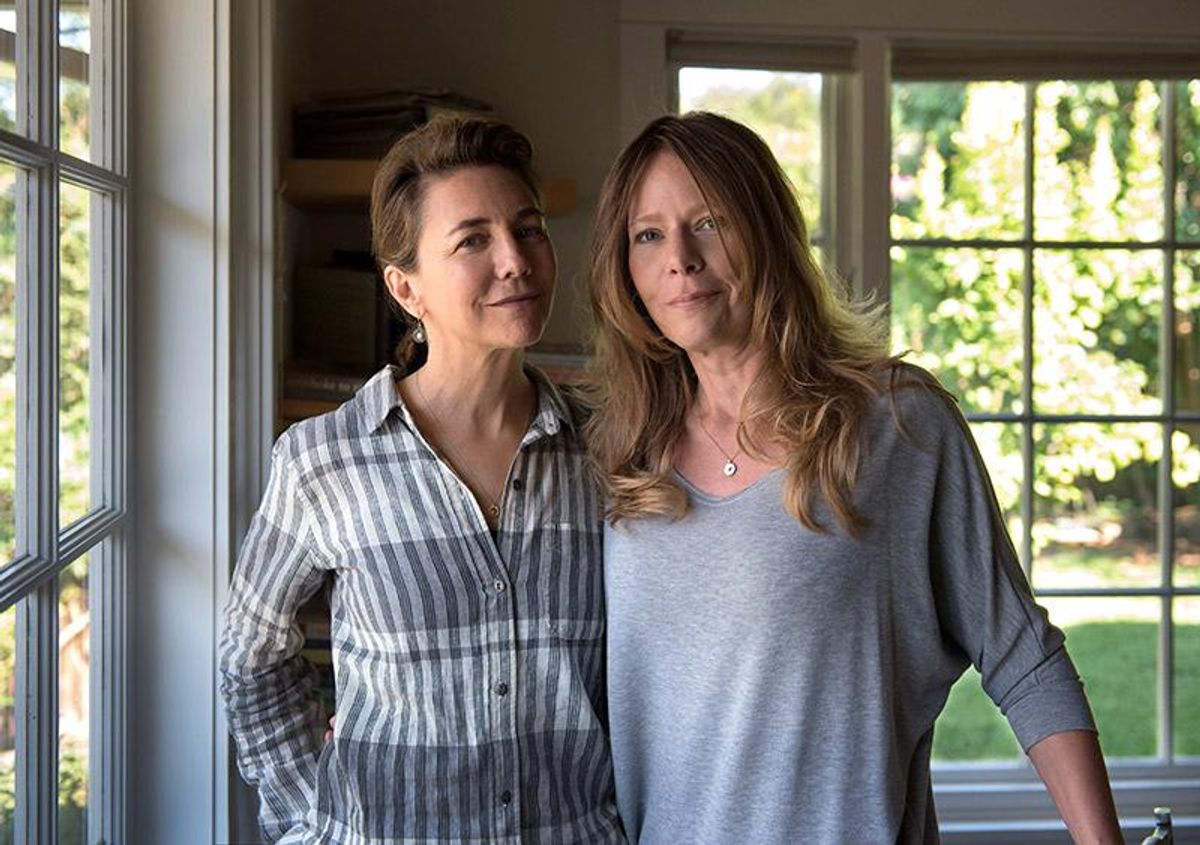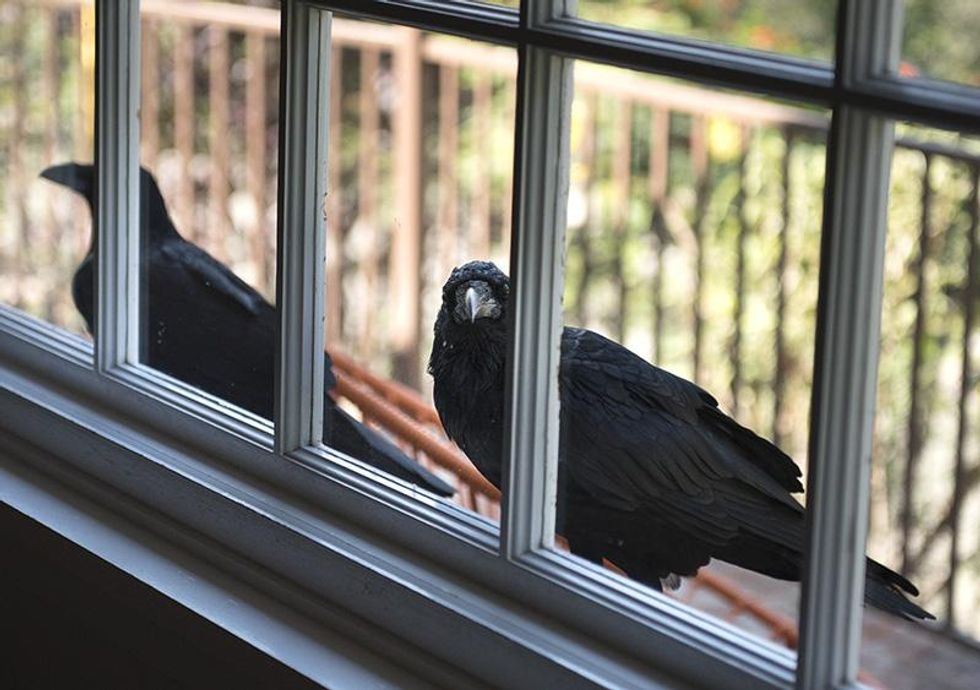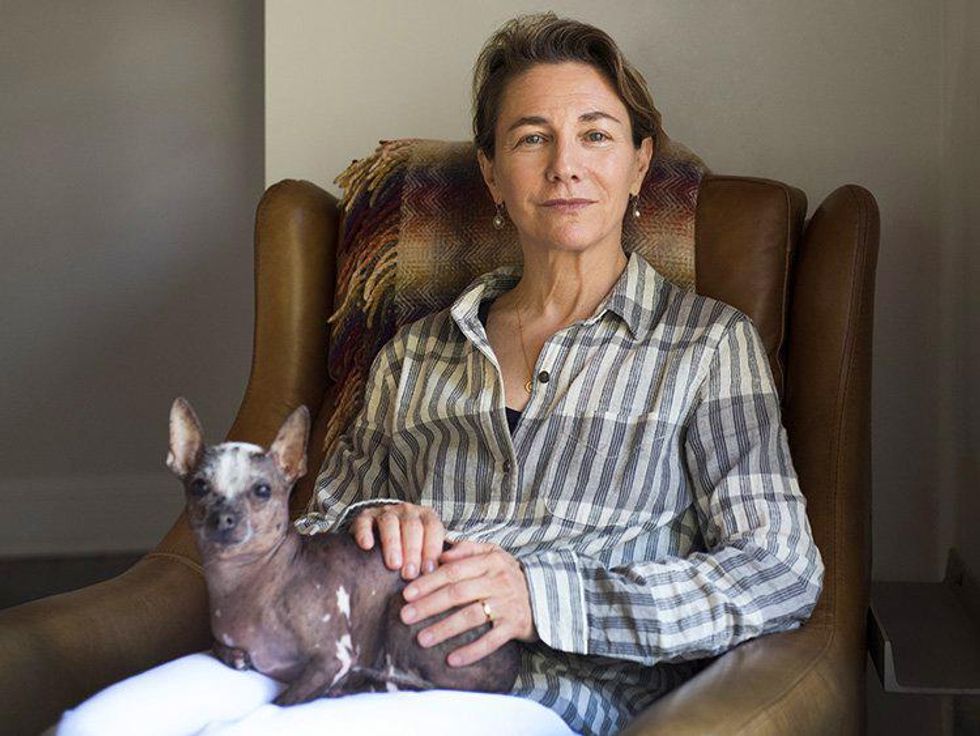Ilene Chaiken, the showrunner and executive producer of Fox's Empire, sits beside her wife, LouAnne Brickhouse, on a couch in their Los Angeles home. The chatter of birds, who flock daily to the numerous feeders and baths scattered across their lawn, filters through the windows. The barking of dogs is heard through the walls. The interior is filled with sun and shelves of books by authors including Louise Bourgeois, Jennifer Egan, and James Baldwin.
At present, one of these great names plays a role in Chaiken's life. James is, at the moment of her interview with The Advocate, tapping on the front window -- not the deceased writer of the gay classic Giovanni's Room, but an adult male raven bearing his name.
As James knocks on the pane -- a signal to the human inhabitants that either he, his mate, Margaret (named after the cultural anthropologist Margaret Mead), or their four offspring are hungry -- Chaiken articulates why LGBT people should care more about animals.
"The whole coming-out process makes most of us know the outsider experience," Chaiken explains. "The animals are also outsiders. ... I also know that so many people who have been marginalized have looked to animals as their only companions at times in their lives. They certainly don't judge us."
"I feel I'm way cooler than most people, straight or gay, because my best friend's a raven," adds Brickhouse, a former executive at the Walt Disney Co., with a laugh. "And when I go hiking, he follows me and does flips in the air. You can't beat that. It's on Instagram too."

This Instagram account, The Daily James, is filled with images and videos of the "ongoing soap opera of drama and comedy" staged by the nearly 100 species of birds and other fauna that flit and fly through the couple's property, which is perched in the Laurel Canyon neighborhood of Hollywood Hills.
The adventure began in April 2015, when the couple installed their first bird feeder -- and first met Margaret and James. It was love at first flight. Since then, the couple has designated the space a certified wildlife habitat. They created The Daily James not only to chronicle these interactions, but also to raise awareness of the natural world and show others that they too can be a part of it.
"You don't think of Los Angeles as a place of nature," Brickhouse says. "We're in our houses. We're in our cars all the time. But the nature is all around us ... and if you nurture it, it will come to you. It needs our help, because we're taking the land away."
"It seems so far away," she adds of the perception of nature and the various challenges it faces. "Like how can I help elephants in Africa? Or the poaching of lions? But when you realize it's right in front of you, if you put yourself out there, it makes a big difference. It makes it more personal."
"It humanizes them. It humanizes us," adds Chaiken.
Since their first meeting, James has come to tap on their windows an average of 8 to 10 times a day. In response, Brickhouse will bring out food -- sometimes on a silver platter, which is sometimes filled with eggs poached by Chaiken. But the relationship between these birds and humans is far more than culinary. James will sit with Brickhouse on the porch as she's reading The New York Times. He chases coyotes away from the property. And when accepting food from Brickhouse, James will bow his head.
"He's not only recognizing me as a female, but he's showing deference and gratitude like he would a female raven," Brickhouse says. "It's amazing that I'm having that kind of interaction with this big black bird that most people think is going to bring them death. But it's the most tender interaction that I've had with nature."
James will also bow to his mate, Margaret. In fact, much of the birds' behavior expresses what Chaiken and Brickhouse, who will be celebrating their third wedding anniversary this year, call "relationship goals." James is devoted, a good father to his children, and has an "extraordinary" love for Margaret.
"You think, they're just birds! But they're not," Brickhouse says, adding of nature, "It teaches us to be better humans."
Chaiken and Brickhouse, members of the Los Angeles Zoo, are very much lovebirds themselves in this nest they share with all manner of life. The pair dated for five years before marrying in November 2013. However, they had what Chaiken calls "a long courtship." They came to know each other from viewing parties for Showtime's The L Word -- Chaiken's groundbreaking first show, about lesbians in Los Angeles, which ran from 2004 to 2009. At one of these parties, Brickhouse introduced Chaiken to the late director Garry Marshall (Pretty Woman). Although Brickhouse was in a relationship at the time, Marshall, observing the pair together, knew a match when he saw it.
"Have you met anyone? Are you seeing anyone? Who do you like?" Marshall asked Chaiken, who at the time had recently ended a long-term relationship with architect Miggi Wigg, with whom she parented two daughters, Tallulah and Augusta. In recounting the story, Chaiken's voice echoes Marshall's by dropping in volume to a confidential whisper. "It would be LouAnne, right?" he asked. "That's the kind of person you're looking for."
"She never knew it, that Garry had said to me, 'LouAnne is the person who you should be with,'" a smiling Chaiken says of her partner. "He knew. He makes romantic comedies."

Chaiken makes dramas. In addition to advocating for the natural world on Instagram, she is known as the showrunner of two different series that have been trailblazing for historically marginalized communities. The L Word was the first show to put the lives of lesbians front and center. The second, Fox's Empire, is one of the most influential shows to showcase African-Americans on broadcast television today. Its third season premieres this week.
Because she's a woman and a lesbian, Chaiken's position at the helm of these productions is noteworthy in an era when Hollywood still struggles with diversity, especially behind the camera. Chaiken is not dismissive of the challenges.
"Clearly, it's still a boys' club," says Chaiken, who points out that media representation of women is "astoundingly unequal" to that of men, even though they make up 50 percent of the population. The battle is still ongoing for LGBT people, who are almost nonexistent in major studio films.
"As a gay person, there's still is just an uphill road for us to hoe," says the 59-year-old writer. "We are underrepresented vastly, and we haven't been represented in all of the ways in which we live in the world. I think it's incremental, the progress that we see in that regard."
While television is outpacing film in regard to diversity, the progress is not seen across the board. CBS came under fire this summer for revealing a fall season of shows that centered around white straight men. Many shows, like the CW's The 100, also ran into controversy for including LGBT characters and then killing them off, a throwback to the era of the Hays Code, under which gay people were seen to live "a tragic life and you have to have a tragic end." But this tension should come to no surprise to anyone paying attention to the current presidential election.
"Look where we are," Chaiken says. "It's this extraordinary political moment and these two countervailing trends of political culture. There's this great leap forward and this hideous and appalling kind of slide backwards. There's a real tension in our culture right now that's still being reflected in the entertainment culture."
Regardless, she stresses that her identities are "strengths," not weaknesses, in the entertainment industry, particularly in her role as showrunner, in which capacity she leads Empire's writer's room.
"The qualities that I ascribe to being a woman and to being gay are the things that I think make me good at my job," says Chaiken. "There are different ways of being a showrunner. And I like to think that I do it with a sense of inclusiveness, with a view to listening and welcoming the input of my colleagues and nurturing."
"I became a mother before I became a showrunner," adds Chaiken. "And when I became a showrunner, I immediately recognized that I was using parenting skills."
In many ways, her experience with The L Word, which provided a voice for the lesbian community, was also the ideal preparation for being a showrunner of a show that gives visibility to African-Americans. Chaiken, who was once a producer on The Fresh Prince of Bel-Air, is white. But she learned early on the importance of having authentic voices.
Initially, Chaiken was convinced by Showtime to hire writers on The L Word who were experienced in the craft but who were straight, because "I believed them and also wanted to be a good girl," she recalls. It quickly became apparent that writing experience was no match for the lived experience of being a lesbian.
"It just was so clear that in taking on this mission of doing the first show about lesbians in the history of mainstream television that lesbians had to tell those stories," she says. "We're pulling back the curtain on our lives, and we're the ones who know our lives."
"It was joyful. We never got to tell our own stories before," she says.
She applied this learned lesson to Empire. Chaiken filled the writers' room with African-American storytellers straight out of the gate. She describes her role as being like a "conductor," as she is careful to rely on her writers' authentic voices, not override them.
"The L Word was my story, my voice, my culture, and I embraced that," Chaiken says. "But when I came to do Empire, I was profoundly aware that I'm making a show that's not about my culture.
"I have plenty to do, and it's a thrilling kind of creative experience for me, but I would never deign to say this is the story we're telling," she says, adding, "It's not like my script just represents my point of view. I give my scripts to a couple of writers and I say, 'Take a pass. Help me with this. Write this character, this voice.' Just constantly soliciting that input."
And as someone who grew up a "suburban Jew outside of Philadelphia" and "middle-class comfortable," Chaiken has found her eyes have been opened by the stories that have unfolded on Empire. Created by out filmmaker Lee Daniels and Danny Strong, the musical drama has featured storylines that range from coming out to incarceration to political movements like Black Lives Matter, which are all served on a deliciously soap-operatic dish. And that's how it should be.
"When television is great, it's because it connects us to an experience that we might not otherwise have, and ideally a cultural experience that lets us see people that we haven't had the opportunity to be close to, to see them intimately," Chaiken says. She has seen how great television "makes us aware of how connected we are." It shows what Hollywood can accomplish when it is at its best.
"I think Hollywood is fabulous," says Chaiken. "I love it. It's craven. And it's all the things that everyone says it is, but it's also fabulous."
Of course, Hollywood still has its problems, among them a perception of bias in LGBT hiring. The recent casting of the cisgender actor Matt Bomer in a transgender role -- and the "transface" backlash it received from trans people -- demonstrates how many yearn for authentic representation. Jeffrey Tambor, while accepting an Emmy Award for playing the trans character Maura on Transparent,even urged Hollywood to cease the practice.
Chaiken is "wary" of wading into the debate over trans representation, bowing to others with more experience who can better speak to it. But she is adamant that straight actors should have the opportunity to play gay roles, and vice versa.
"We live in a world where most roles and most big roles are straight characters, I certainly wouldn't want to exclude all gay actors from playing those roles. So by the same token, I think we can't tell straight actors that we can't portray our characters," she says.
However, Chaiken also recognizes the significance of out actor Jussie Smollett playing the out character of Jamal Lyon on Empire.
"It does come to have a greater meaning when the role is played by a gay actor who also is an activist and wants to be an activist in the world," Chaiken says. "That's very powerful. It certainly wasn't a requirement in casting the role. But it's really beautiful that it's worked out the way that it did and that Jussie has proven to be such a great advocate."
The road to LGBT advocacy had a rocky start for Smollett, in part because the way the media handled its reporting of his sexual orientation was "a little mucky at first," as Chaiken says. During the show's first season, outlets claimed that Smolett was "outed" by another Empire actor after his identity was mentioned in an interview. The speculation reached a point where Smollett had to appear on The Ellen DeGeneres Show to come out publicly. Even then, he addressed it after the formal interview in a taped session backstage, and he did not use the word "gay."
Chaiken says the disconnect between an actor like Jussie and the press is rooted in "a generational thing."
"Jussie is coming up in that next generation in which so much of the work has been done, and Jussie was never in the closet. He's very clear about that," Chaiken says. "But he didn't feel the need [to] just come first as a gay actor. He came first as a performer and an actor playing his character and got a little bit kind of pushed back, when I think he was just being misunderstood."
"I try personally to try to never even talk about other people's sexuality because I think we never know, and I think we should just all define ourselves and speak for ourselves," Chaiken adds. "But Jussie has said, 'I am a gay man.' So I can say that Jussie says, 'I am a gay man.' But he also wanted to acknowledge that there are so many ways of being in the world as a gay man and that sexual fluidity is a thing."
"The choice about how you declare yourself is your choice," she says as advice to any actor wondering how to speak publicly about their sexuality.
Having out actors like Smollett play LGBT roles can be transformative and move the needle for culture. Having lesbian writers create storylines about lesbian characters is essential and can do the same. However, employment discrimination laws currently prohibit casting directors and producers from asking about a person's sexual orientation. Would Chaiken change these laws, knowing they could potentially pose hurdles for LGBT talent?
"It's never occurred to me, because I think we always know," Chaiken says. "I think that, in terms of fairness, I guess that really [what] it's protecting [against] is a bias against us, so I would say that I wouldn't change that. I wouldn't change that law because I think that we need the protection, and I do think that we know one another and the writing community is small enough."
"When agents call to pitch me writers or when studios call and pitch me writers, if the writer is gay, I'm usually told, because people know I'm going to be very open to a gay writer," Chaiken says. "I try to hold myself to the standard that I want others to be held to, so I try not to say I'm looking for a gay writer and assume that because someone is gay, he's going to write a certain way, or she. But sometimes we know what we're thinking."
And what does Chaiken think is missing from television right now?
"I'm just looking at the landscape, and I feel it's time for another great gay show," Chaiken says. "There will be soon, I hope, and not necessarily a show about being gay, although I would welcome that, but also a show that simply is led by characters who are gay and are living their lives. In that way, we get to portray the nuances of our lives."
Chaiken points to historically heterosexual-heavy procedurals as a genre ripe to be reinvented with LGBT lead characters. And she is encouraged by a shift in perceptions of LGBT stories, which were once seen as business risks.
"These aren't risks. These are opportunities," she says. "I think that the real triumph will be when we're in the most accessible places telling our stories."
"I used to say television is stealth activism. Because I always knew that I had an agenda," Chaiken concludes. "How could I not? I'm a writer. I write with an agenda. But I had to be a little stealthy about my agenda -- less so on Showtime where my agenda was embraced -- but particularly in broadcast television when I was endeavoring to create new shows, it was a little bit of more conservative culture. I don't feel it anymore. I feel like passion is what makes shows work. And the networks, the studios, are looking for our passion."




















































































